Is a German Shepherd Dog Right for Me?
Everything you need to consider before adopting a German Shepherd.
Everything you need to consider before adopting a German Shepherd.
by Emily Johnson, | January 29, 2025

THAIS RAMOS VARELA / Stocksy
German Shepherds originated in Germany as herding dogs. Today they are not just adept working dogs, but also total lovebugs when it comes to hanging out with their pet parents and any kids in the family.
These pups are famous for their smarts, loyalty, and drive — making them one of the most popular dog breeds. But before you adopt a German Shepherd, it’s also important to know if their personality and needs fit into your lifestyle. Read on for more details about the temperament and social needs of German Shepherds.
German Shepherds are naturally watchful, super energetic, and love to be with their families. If you’re an active person or have an adventurous household, their energy and dedication can be a perfect match. However, these dogs need a lot of attention and training to stay happy and well-behaved. So, if you’re often away from home or have a packed schedule, it could be tough to meet their needs.
These dogs are great with families, but they need early socialization to learn how to interact with strangers and other pets. They also do best in homes where they have a job to do or a purpose, whether it’s through training, play, or physical activity. If you’re looking for a loyal companion who’s always up for an adventure — but can also look out for the family — a German Shepherd might be the right choice.
German Shepherds are known for their strong loyalty, intelligence, and energetic nature, making them one of the most versatile and beloved dog breeds. Whether they’re working alongside police officers, assisting people with disabilities, or simply being devoted companions, their abilities shine in countless ways. Let’s break down some of their key traits.
Loyal: They form close bonds with their people and are highly attentive, making them excellent watchdogs and companions.
Super smart: German Shepherds are fast learners and are always eager to please, which is why they’re used for jobs like police and service work.
High-energy: These dogs love to stay active. But without enough exercise, their pent-up energy can easily turn into boredom or mischief.
Playful: When they’re not hard at work, they love to play and engage with their family, especially when given tasks or games that challenge them.

lightman_pic / Shutterstock
German Shepherds are high-energy dogs, so they’ll need plenty of exercise to stay happy and healthy. If you're an active person, this breed will fit right in.
Exercise needs and daily routines: These dogs need at least one to two hours of activity each day. That could be a long walk, run, or some vigorous playtime. They’re great for outdoor adventures like hiking or dog sports like agility training.
Mental stimulation through training and play: Along with physical exercise, German Shepherds need mental challenges. Training sessions, puzzle toys, and interactive games keep their brains busy and help them stay focused. Without enough mental stimulation, they can get bored and act out.
Great for active parents: If you’re someone who enjoys being outdoors and staying active, a German Shepherd will happily join you. If your schedule is more low-key, you’ll need to find other ways to keep them busy and burn off their energy.
While German Shepherds don’t need a lot of professional grooming, their double coat means they shed quite a bit, especially during seasonal changes. German Shepherds have a down-type undercoat close to the skin with a longer, coarse outercoat. “Under normal conditions, the Shepherd will only require regular brushing and an occasional bath. Diet plays a significant part in coat condition, so feeding quality foods will help prevent any skin problems,” says the German Shepherd Rescue of Northern California’s grooming guide.
Double coat and shedding management: German Shepherds have a thick double coat that sheds year-round, with extra shedding in the spring and fall. Brushing them regularly will help manage the shedding.
Time commitment for grooming: You won’t need to take them to a groomer often, but brushing them weekly (and more often during shedding seasons) will help keep their coat in good condition.
Seasonal grooming needs: When the weather changes, German Shepherds shed even more, so you’ll need to stay on top of brushing during these times to avoid extra fur drifting around the house.
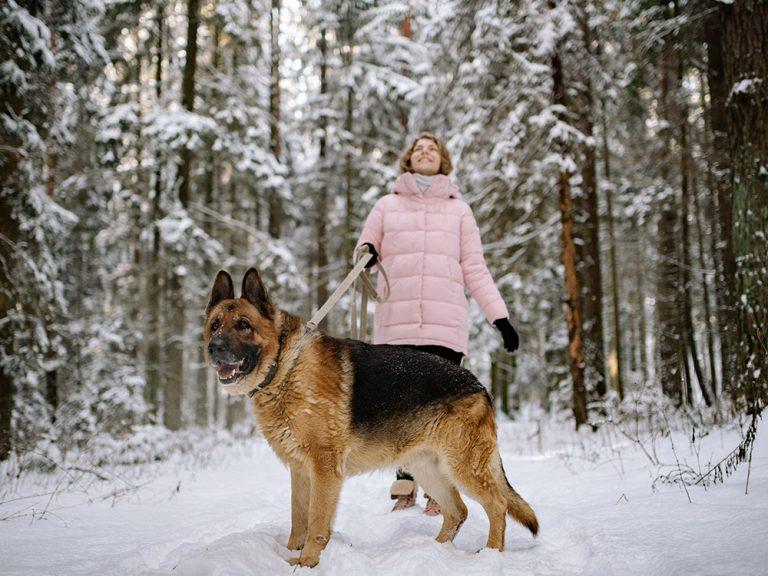
Yan Krukau / Pexels
German Shepherds can adapt to different living environments, but they’ll thrive best in homes where they are part of a family. The German Shepherd Rescue of the Rockies says German Shepherds should not be “left out in the yard, away from [their] family, isolated, or deprived of touch or attention. GSDs are not couch potatoes, and they will insist on interacting with their family. They will not thrive as a kennel or backyard dog.”
Best suited for larger spaces: German Shepherds love having space to move around, so a home with a yard and plenty of space is ideal. They enjoy having room to run and play. If you live in an apartment, they can adjust, but you’ll need to make sure they get enough outdoor time and physical activity every day.
Outdoor and indoor balance: A German Shepherd will appreciate time outside, but they also enjoy relaxing inside with their family. A good balance of both is key to keeping them happy.
German Shepherds are wonderful dogs, but they aren’t for everyone. Here are a few situations where they might not be the best fit.
Potential health concerns and costs: They’re prone to health issues like hip dysplasia and megaesophagus, so you’ll need to be prepared for potential vet bills as they age.
Not ideal for first-time dog parents: German Shepherds are intelligent and energetic, which can be overwhelming for first-time owners. They need consistent training and a confident hand to guide them.
Lack of time for training and exercise: If you don’t have the time to commit to their training and exercise needs, these dogs are quick to get frustrated or anxious, leading to behavioral issues (e.g. destructive behavior, barking, aggression).
“Breed Standard.” The German Shepherd Dog Club of America, www.gsdca.org/breed-standard.
“Breed Standards: German Shepherd Dog | United Kennel Club (UKC).” www.ukcdogs.com, www.ukcdogs.com/german-shepherd-dog.
“Breeds of Police Working Dogs | City of Tulare.” Www.tulare.ca.gov, www.tulare.ca.gov/government/departments/police/patrol-division/k-9-unit/breeds-of-police-working-dogs.
Greenberg, Aurora. “German Shepherd Dog.” American Kennel Club, 6 Nov. 2017, www.akc.org/dog-breeds/german-shepherd-dog.
Toncho Penev. “Fear and Aggression in German Shepherd, Boxer and Rottweiler Dogs.” Academia.edu, 2015, www.academia.edu/77641122/Fear_and_Aggression_in_German_Shepherd_Boxer_and_Rottweiler_Dogs. Accessed 11 Jan. 2025.
“GSD Grooming and Care.” German Shepherd Rescue of Northern California, GSRNC, www.gsrnc.org/images/Care_and_grooming.pdf.

Emily Johnson is a long-time pet writer and animal lover, working with brands like PetMD, Rover, Kinship, and more. She’s cared for dogs, cats, and horses her entire life and strives to help fellow pet parents through her content.
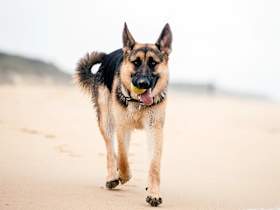
Adoption Advice
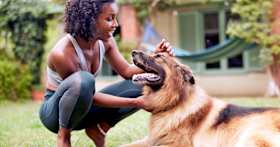
Breed Info
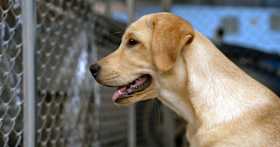
Shelters & Rescue
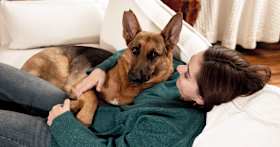
Behavior & Training

Breed Info
These cute mixes showcase a lovable blend of breeds, offering endless charm and personality.
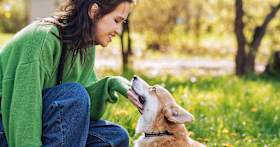
Breed Info
Considering a Corgi? Here’s everything you ever wanted to know about the many, many types of Corgis
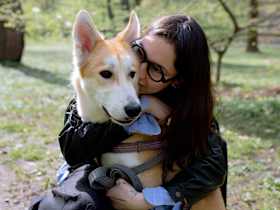
Breed Info
Plus, five things to know before adding one of these mixed-breed dogs to your family.
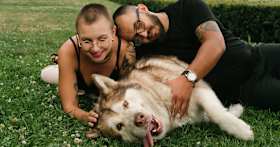
Breed Info
Read up on large dog breeds and what it takes to keep them happy.
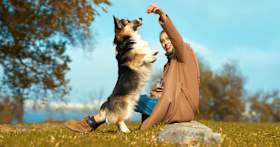
Breed Info
Looking for an intelligent pup? You’ve come to the right place.